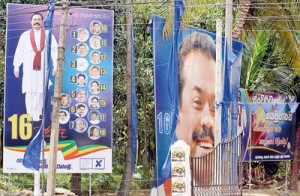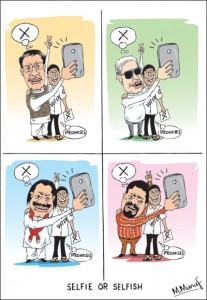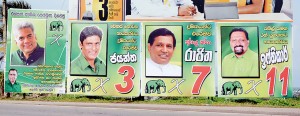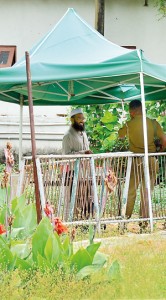Columns
Cheerful President tells Cabinet, “We will meet again after the polls”
- PM and UNFGG leaders elated over Sirisena’s pledge that Jan. 8 transformation must continue
- UPFA concerned that even if it wins Rajapaksa won’t get PM post, secretaries seek urgent meeting with party leader
- Breakthrough in Thajudeen probe, VVIP wife’s van used in abduction, but no arrest till elections end

A roadside cutout of UPFA candidate Mahinda Rajapaksa in the Kurunegala District. Pic by Pushpakumara Jayaratne
President Maithripala Sirisena did not hide his wish that the United National Party (UNP) should be voted to power at the August 17 parliamentary elections. In a cheerful mood, he told Wednesday’s ministerial meeting that he was looking forward to work with them to carry forward the January 8 policies or January atey prathipaththi idiriyata geniyanna balapuruththu venawa. He referred to the mandate he won or dinaagaththa jana varama. He was alluding to the pledges made at the January presidential election by parties that backed him. This time, however, they will be under the aegis of the United National Front for Good Governance (UNFGG).
It was the last meeting by the Cabinet of Ministers who have remained in office for seven months. The next ministerial meeting will only be after the elections when Sirisena will swear in a new Cabinet. Prime Minister Ranil Wickremesinghe thanked President Sirisena for his full support extended to his Government and for ensuring the dawn of what he called a new democratic era.
That President Sirisena made those bold remarks before the curtain fell on meetings of the Cabinet of Ministers of the ‘rainbow coalition’ elated the UNP. It was the only the other day he had said “Jayawewa” to the United People’s Freedom Alliance (UPFA) hierarchy when they presented him with their manifesto. Sirisena remains the head of the UPFA for all intents and purposes.
This was the second time he has uttered words that gave an assurance to the UNP. First was during an address to the nation on July 14 where he declared that he would urge “the people to select those who are suitable to march forward with the January 8 mandate.” The message was clear – support the United National Party (UNP) and its allies. He added, “After the election results are declared, for the next five years I will take forward the transformation that began on January 8 and continue on the same path for the next five years.”
 The first appeal was directed at the public. The second, at the last ministerial meeting, bolstered confidence and morale of UNP leaders for a number of reasons. By re-iterating that he wished to see the return of a UNP Government, Sirisena was making clear for a second time that he was on their side. It becomes significant for a variety of reasons. As in every election, there is a victor and a vanquished. This time around, pollsters were making different predictions, some forecasting an outright UNP victory whilst others saying they would fall short of a simple majority, but could form a Government with the Tamil National Alliance (TNA). Yet others claimed there was a slight edge for the UPFA or they were in a very close race with the UNP with an undecided voter element poised to have the final say. Who is right will be known in just nine days.
The first appeal was directed at the public. The second, at the last ministerial meeting, bolstered confidence and morale of UNP leaders for a number of reasons. By re-iterating that he wished to see the return of a UNP Government, Sirisena was making clear for a second time that he was on their side. It becomes significant for a variety of reasons. As in every election, there is a victor and a vanquished. This time around, pollsters were making different predictions, some forecasting an outright UNP victory whilst others saying they would fall short of a simple majority, but could form a Government with the Tamil National Alliance (TNA). Yet others claimed there was a slight edge for the UPFA or they were in a very close race with the UNP with an undecided voter element poised to have the final say. Who is right will be known in just nine days.
An outright victory for the UNP would easily ensconce its national leader Ranil Wickremesinghe in the seat of Prime Minister. What of a UPFA victory? Sirisena has declared publicly that he would not pick former President Mahinda Rajapaksa as the Prime Minister. Interesting enough, Rajapaksa has emerged as the de facto campaign leader of the UPFA. In the past weeks, he has been visiting different districts and is the lead speaker at UPFA rallies. Yet, his aspirations to become Prime Minister in the event of a victory, to say the least, would be embroiled in controversy. As was the case before, the 19A empowers the President to “appoint as Prime Minister, the Member of Parliament, who, in the President’s opinion, is most likely to command the confidence of Parliament.” Under the circumstances that could mean someone other than Rajapaksa.

Roadside posters of UNP candidates in the Kalutara District . Pic by Sarath Siriwardene
On the other hand, Sirisena’s remarks to the final session of the Cabinet of Ministers also raise the prospects of a ‘National Government’ in the event the UNP does not gain a working majority. That would naturally see some of the successful UPFA candidates, mostly supporters of Sirisena, veering away from the Rajapaksa fold to join the National Government. In such an event, existing provisions in the Constitution restricting a Cabinet of Ministers to thirty or an aggregate of deputies and state ministers to 40 will not apply. The 19A makes provision which states “…where the recognised political party or the independent group which obtains the highest number of seats in Parliament forms a National Government, the number of Ministers in the Cabinet of Ministers, the number of Ministers who are not Cabinet of Ministers and the number of Deputy Ministers shall be determined by Parliament.” Cabinet portfolios are an attractive incentive to a party that gets most seats to induce opponents to join its ranks. This was even evident after the January presidential elections. It is only ahead of the parliamentary elections that most UPFA members resigned to join the Rajapaksa fold. Not surprisingly, the main contenders have already approached would-be targets on their respective opposite sides.
President Sirisena’s announcement last Wednesday is not good news for the UPFA leaders. UPFA General Secretary Susil Premajayantha and Sri Lanka Freedom Party (SLFP) General Secretary Anura Priyadarshana Yapa were seeking a meeting with the President. They were to urge Sirisena to make another address to the nation, this time to give his blessings for the return of a UPFA Government. After all, they contended, he was their leader. The matter was discussed among UPFA seniors who said they had not demonstrated any opposition to Sirisena and therefore he was duty bound to back them. Hence, they said the two General Secretaries should meet him and make the appeal. Ahead of that, Sirisena had made his wishes known to the Cabinet of Ministers.
To add to that, Yapa telephoned Sirisena early this week with an appeal to convene the Central Committee of the SLFP. However, Sirisena’s lawyer Faizer Mustapha had initiated moves in the District Court of Colombo on Thursday to get an extension of the enjoining order preventing the convening of a CC meeting. It will be in force till August 24 — a week after the parliamentary elections. For the first time, the leader of one of Sri Lanka’s largest political parties was relying on court orders repeatedly to hold back a meeting of a representative body of his own party. Quite clearly Sirisena wants to ward off any move by the CC to adopt a resolution making Rajapaksa the party’s Prime Ministerial candidate. With the address to the nation and his declaration to the final ministerial meeting, Sirisena has made clear where he stands. Thus, any victory for the UPFA, if indeed it is the case, will not be enough. The UPFA would have to pass another hurdle and how it would clear that would depend on the number of seats it would receive. It is only a comfortable majority for the UPFA which could well be its bargaining chip. Yet, the question remains whether there would be one.

Police officers in hut guard the grave of late rugger star Wasim Thajudeen, whose body will be exhumed tomorrow. Pic by Indika Handuwela
UNP discusses polls violence
However, for the UNPers, who are confident that they are on a winning streak, the issue of polls related violence was of serious concern. So much so, Prime Minister Wickremesinghe summoned a meeting of his party organisers at ‘Temple Trees’ last Tuesday. It was Justice Minister Wijeyadasa Rajapakshe who was most critical. He said he had wanted to ask the Police to arrest drug peddlers and criminal elements who were the cause for election violence. He was highly critical of a ministerial colleague who had engaged the services of underworld elements. Though present, the colleague maintained stoic silence. Rajapakshe was alluding to the incidents in Kotahena where shooting by unidentified gunmen left one dead on the spot and another victim later at hospital. Also in for criticism was Deputy Minister Sujeeva Senasinghe against whom the Police have also initiated action. There was a heated exchange between this Deputy Minister and another candidate, who formerly worked for a television channel. The Criminal Investigation Department (CID) has taken charge of investigations into the Kotahena incident. It has focused on the role played by underworld groups.
Over incidents involving UNPers, Deputy Justice Minister Sujeeva Senasinghe came in for strong criticism at a news conference of the UPFA on Friday. It began with the screening of video footage showing Senasinghe criticising the Police. He has locked horns with Police Chief N.K. Illangakoon who has stoutly defended his men. UPFA General Secretary Premajayantha said, “This video was taken from a media conference but it was not shown by some media outlets. They must be scared that he will file a court case against them. May be because he is the Deputy Justice Minister.” He was alluding to Senasinghe’s description about an incident in Homagama where he accused a Police officer of being drunk. That was reportedly after the officer concerned had told him not to conduct a meeting on the road side and pointed out that the use of loudspeakers there was illegal. The Deputy Minister of Justice had contended that he was using a “Buffel” (speakers usually connected to music systems) to connect a microphone. The point he appeared to make out was that it was not a loudspeaker. On the other hand, the Police have already filed a “B” report in the Kaduwela Magistrate’s Court against Senasinghe for obstructing a Police officer in the discharge of his duty, causing public nuisance, unlawful assembly, criminal intimidation and violating election laws. So much for a Deputy Minister of Justice!
In fact, instructions sent out by Gamini Nawaratne, Senior DIG in charge of the Elections Secretariat at Police Headquarters after consultation with the Attorney General’s Department, have set out guidelines for Police countrywide on the use of loudspeakers. Permits for their use throughout Sri Lanka are issued by Police Headquarters to the President, the Prime Minister, Cabinet Ministers and all Leaders of Political Parties recognised by the Commissioner of Elections. To local organisers, a permit is issued by the ASP of the District stipulating the time limit. The guideline says, “That the loudspeaker shall not be operated on Public Roads, or from moving vehicles but on private land with the permission of the owner of the land, which should be available for inspection by the Officer-in-charge of a Police Station.”
“At the news conference in question, Sujeewa Senasinghe is asking; ‘Is this good governance?’ referring to the Police Officer. We should be asking him whether his conduct is ‘Good Governance.’ This kind of behaviour shows that they want governance by the underworld. Premjayantha also announced that some candidates who were contesting on the party ticket would have their membership cancelled for ‘violating policies of the party and coming forward as UNP candidates.” He said, “They are Hirunika Premachandra (Colombo District), Nirosha Athukorala (Gampaha District), Nishantha Warnasinghe (Kalutara District), Suresh Vadiwel, (Badulla District) and Hewa Anthonyge Piyasena (Matara District). We will send notices to the Elections Commissioner and parties about this decision. After we get the letter by the Elections Commissioner we will take steps to appoint the next members in their places (to the provincial councils).”
These notwithstanding, the UNP is pushing ahead with its campaign in different ways. On Thursday, more than a thousand members of the Buddhist clergy were invited to an alms giving at Apey Gama in Battaramulla. On Friday, the UNP Leadership Council’s one-time chairman, Karu Jayasuriya, addressed a luncheon meeting of Non-Governmental Organisations. He said they were previously branded as “diaspora agents” or “dollar kaakkas.” However, he said the UNP Government considered them one of the pillars like the state and the private sector.
Breakthrough in Thajudeen case
Another high profile investigation is now under way by Criminal Investigation Department (CID) detectives into the death of a well-known rugger player Wasim Thajudeen. The Police, who have made a breakthrough, have decided that no arrests would be made into those linked to the case until the August 17 polls are over. This week detectives recorded statements from Jagath Abeysinghe, Director of the Sri Lanka Red Cross Society (SLRS). They also recorded a statement from a one-time girlfriend of Thajudeen. Several calls to Abeysinghe for his response went unanswered.
SLRCS Director General Tissa Abeywickrema, who said he was speaking on behalf of the Chairman, admitted that the society had released one of their vehicles to the NGO of the VVIP family member. He said that Chairman Abeysinghe had made a statement to the Criminal Investigation Department in this regard.
The Sri Lanka Red Cross Society has operated since 1936, first as a branch of the British Red Cross and then from 1949 to 1971 as the Ceylon Red Cross Society. It was recognised by the ICRC and admitted into the League of Red Cross Societies (now the Federation of Red Cross/Red Crescent Societies) in 1952. The Ceylon Red Cross Society was renamed as Sri Lanka Red Cross Society in 1972. The society was recognised by Royal Charter in 1951 and as a charitable organisation in 1959, by a gazette notification of the Finance Ministry. It was also registered under the Social Service Act 33 of 1980. How such an organisation with international links loaned its assets to NGOs is unclear.
It has transpired that a white Land Rover Defender registered in the name of the Red Cross Society, and loaned to an NGO of a former VVIP family, has been used in the alleged abduction and torture of Thajudeen. It has been established through surveillance video footage from a Havelock Road supermarket which Thajudeen had visited before being abducted. During use by the NGO, the white Defender Jeep had been re-painted in black. The body of Thajudeen, in a grave at the Muslim burial grounds adjoining a mosque alongside Kalubowila Road, Dehiwala, will be exhumed tomorrow on a Court order. The mosque authorities have even constructed a hut for the police officers guarding the grave to provide protection from sun and rain. A report from the Judicial Medical Officer on the body of Thajudeen eventually found along Park Road near the Shalika Hall at Narahenpita in May 2012 has said that there was evidence suggesting assault on the head by a pole, teeth being removed and bones in the leg being broken. Detectives are also probing whether this report was deliberately suppressed by any Police official or others.
Polls notwithstanding, this investigation as well as those being conducted by the Financial Crimes Investigation Division (FCID) and the CID will continue. A senior Police official said, however, that no arrests would be made until the elections were over with regard to these cases.
Public complaints on polls law violations
A notable feature of the polls is the steady public response to what they perceive as violations. Since nominations until last Friday, the Campaign for Free and Fair Elections (CaFFE) Executive Director Keerthi Tennekoon told the Sunday Times, his movement had received more than a thousand complaints. He added, “We have also been informed that nearly 57 percent of the persons arrested are those associated with the UNP. This clearly shows the Police are not facing any major political pressure from those in the Government like in the past. We are noticing a change in the trend of violations. For example in the last four days there were no major incidents. In the period prior to that we experienced several serious cases.
“Among the chief candidates we have observed an increase in the posters for Ravi Karunanayake, Sujeewa Senasinghe, Susil Premajayantha and Wijeyadasa Rajapakshe in the Colombo District. In the Gampaha District there were those of John Ameratunga among others. The shooting incident in Kotahena, we have found, is a clash between two rival underworld gangs.
“One underworld group was trying to target another. However, they had escaped at the time of the shooting making civilians become the victims. There are several other candidates who have brought underworld members into the campaign. Therefore we can expect a few violent incidents as the campaign intensifies.”
People’s Action for Free and Fair Elections (PAFFREL) Executive Director Rohana Hettiarachchi said: “In the past two weeks an increased number of cases have been reported. We have had nearly four to five cases of election related violence being reported a day in the past two weeks.” He told the Sunday Times, “There are still a few instances where Government resources are being misused and the state authority is abused. However, this is far less compared to previous elections. We have to commend the efforts taken by the Commissioner of Elections and the Police. It is because the law is being strictly enforced that violations have not escalated.” On the shooting incident in Kotahena, Hettiaratchchi said, “We do not have sufficient evidence to say if it was politically motivated or there was rivalry among underworld members.” As is clear, this is in marked contrast to his colleague in CaFFE who accused the underworld.
Tamil parties and their manifestos
In the Jaffna District where complaints of polls related violence have been relatively less, the latest party to announce its manifesto this week was the Crusaders for Democracy. The group made up largely of former Tiger guerrilla cadres has declared that for ethnic reconciliation it has called for the fuller implementation of the 13th Amendment to the Constitution and the Oslo communique of 2002. The 13A was the outcome of the Indian intervention in Sri Lanka in 1987. Matters relating to land use and a provincial police force are among provisions that have not been so far enforced. The Oslo communique, among other matters noted, “….Responding to a proposal by the leadership of the LTTE the parties have agreed to explore a political solution founded on the principles of internal self-determination in areas of historic habitation of Tamil speaking peoples, based on a federal structure within a united Sri Lanka. The parties acknowledged that the solution has to be acceptable to all communities….”
The Tamil National Alliance (TNA) manifesto released a week ago was to give rise to reports that the alliance will not support any new Government until its demands are met. The claim was denied by TNA leader Rajavarothayam Sampanthan who is contesting from the Trincomalee District. “We have outlined our position with regard to a political solution in a framework within a united Sri Lanka. There must be a new Constitution and constitutional arrangements towards this,” he told the Sunday Times. He said that after the results of the August 17 parliamentary elections were known “we will take a decision on whether or not to support a Government.” However, he said there was current thinking that “we should not accept office” and added “all this is subject to change.”
Among the highlights of the TNA’s manifesto is a call for a merged north and east based on a federal structure. “The Tamil speaking Muslim historical inhabitants shall be entitled to be beneficiaries of all power-sharing arrangements in the North-East,” the TNA manifesto said. However, Rauff Hakeem, leader of the Sri Lanka Muslim Congress (SLMC) which is contesting seats under its own banner in the east, told the Sunday Times, “We are opposed to a merger. How can it be achieved?”
Hakeem said the southern electorate “should not buy into this. The electorate is more intelligent.” He, however, added, “They (contents of the TNA manifesto) are political postures. They are not the private convictions of their leaders. At polls time they need to go back to their ideological positions. Unfortunately that leads to a fear psychosis. Strengthening devolution is a good thing. When they take office, they (TNA) would be practical.”
There is little doubt that the new polls laws which Elections Commissioner Mahinda Deshapriya has enforced together with the Police had paid dividends. Cutouts and posters are far less than what we saw in previous elections. Yet, a tour of the Matara, Galle, Kurunegala and Kalutara Districts showed cutouts and posters were still there in a small way in some areas, underscoring the need to tighten election laws. One other problem the Police, who are engaged in a thankless job, face is the threat of the full authority of office being brought to bear on them by some politicians.
Multi-million rupee campaigns
Interesting enough, it is the Police who are ensuring a larger semblance of neutrality to enable the conduct of a free and fair elections. There are, of course, instances where biased conduct has been reported but those are few. Herein lay a great dilemma. Most candidates are spending millions of rupees to get elected. There was the case of one in the outer fringe of the hill country. He lamented that he had spent Rs. 70 million so far for his campaign. On the one hand, such colossal expenditure underscores the need for laws to place limits and public declaration of campaign expenditure. On the other, it highlights a very glaring disparity.
Police personnel who will be deployed at polling booths on August 16 and 17 (polls day) will only receive a pittance — one hundred rupees for refreshments each day. And for those who will be deployed on polls day (August 17) and the next day (August 18) at counting centres, they will receive one hundred rupees for refreshments at night. It would be Rs. 75 for breakfast and Rs. 125 for lunch and refreshment. A marked contrast indeed from that many thousands of rupees supporters of candidates, including those hired from the underworld, would receive. When the polls are over and the results are known, the issues would be forgotten. Additional payments for policemen would be Rs. 75 for shifts exceeding ten hours and Rs. 100 for shifts exceeding 12 hours. Needless to say there is a long felt need for a new Government to look into these aspects and see that those struggling to ensure free and fair elections are rewarded. A nation owes it to them.


Leave a Reply
Post Comment